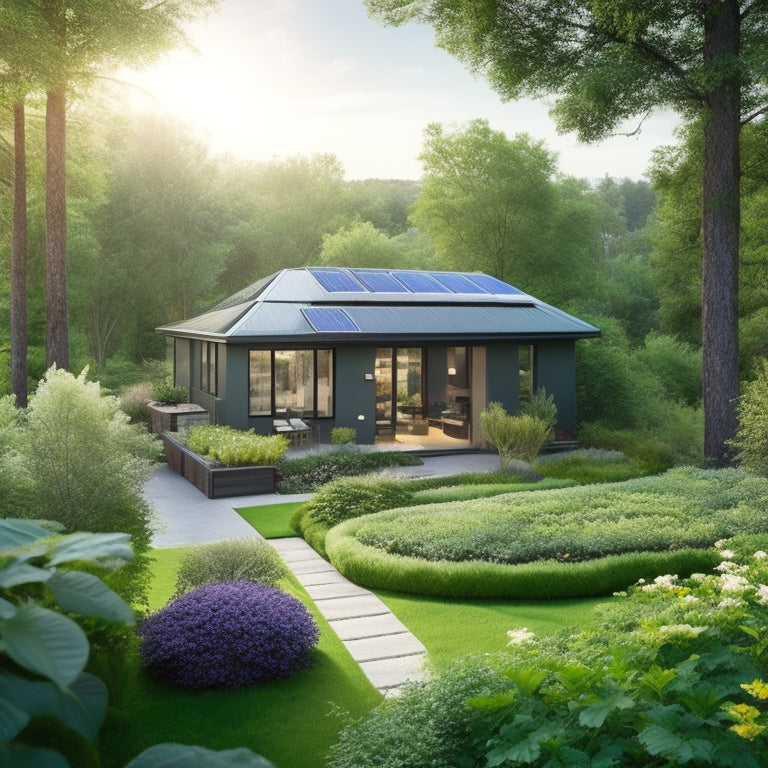
What Makes Home Energy Efficiency Truly Sustainable?
Share
As you endeavor for true sustainability in home energy efficiency, you're likely considering a range of strategies. You're utilizing renewable energy sources like solar, geothermal, and wind power to reduce your reliance on non-renewable energy. You're also reducing your carbon footprint by incorporating energy storage solutions, carbon offsetting, and sustainable building materials. By achieving energy independence with smart technology and optimizing energy storage capacity, you're taking a comprehensive approach to sustainability. By examining the interconnected elements of sustainable home energy efficiency, you'll unveil a path to long-term environmental benefits and a reduced carbon footprint, and identify even more ways to minimize your impact.
Overview
- Integration of renewable energy sources, such as solar and geothermal, reduces dependence on non-renewable energy and minimizes environmental impact.
- Effective energy storage solutions, like advanced battery technologies, enable homes to manage personal energy needs and reduce reliance on the grid.
- Adoption of sustainable practices, including energy-efficient practices and sustainable building materials, significantly lowers environmental impact.
- Real-time energy usage tracking and smart technology optimize energy conservation and efficiency, enabling adjustments to minimize waste.
- Long-term sustainability benefits are achieved through regular energy audits, community engagement, and lifestyle changes towards sustainability.
Harnessing Renewable Energy Sources
As you investigate ways to optimize your home's energy efficiency, utilizing renewable energy sources becomes an essential step in reducing your carbon footprint and reliance on fossil fuels.
You're taking control of your energy needs and contributing to a sustainable future. For instance, high-efficiency solar systems with advanced inverters and storage solutions enhance performance and reliability, allowing homeowners to generate clean energy independently.
Geothermal heating, for instance, taps into the Earth's natural heat, providing a reliable and consistent source of warmth.
Alternatively, wind energy captures the power of air currents to generate electricity, offering a clean and abundant resource.
By integrating these renewable energy sources into your home, you'll considerably decrease your dependence on non-renewable energy and reduce your environmental impact.
This proactive approach not only benefits the planet but also enhances your freedom and independence from external energy suppliers.
Reducing Carbon Footprint Effectively
While shifting to renewable energy sources is a considerable step in reducing your carbon footprint, there are additional strategies to further minimize your environmental impact.
Incorporating energy storage solutions, such as deep cycle lead-acid batteries, can provide reliable power and reduce dependence on fossil fuels. You can implement carbon offsetting strategies, which involve calculating and compensating for your emissions by investing in projects that reduce greenhouse gases elsewhere.
Furthermore, incorporating sustainable building materials into your home's design and construction can greatly reduce your carbon footprint. These materials, such as recycled glass and low-carbon concrete, have a lower environmental impact compared to traditional materials.
Energy Independence for Homes
By integrating energy storage solutions and carbon offsetting strategies into your home's design, you've taken significant steps towards reducing your reliance on the grid.
This move towards energy independence allows you to utilize and manage your own energy, giving you more control over your consumption. With the ability to store excess energy, you can reduce your energy bills by using stored energy during peak hours and contribute to a cleaner environment by lowering carbon emissions.
Smart technology plays an essential role in optimizing energy conservation, ensuring that your home is running efficiently and effectively. With advanced monitoring systems, you can track your energy usage in real-time, making adjustments as needed to minimize waste.
Solar Power for Home Efficiency
By incorporating solar power into your home's energy system, you're tapping into a renewable energy source that reduces your reliance on non-renewable resources.
This means you'll see lower energy bills, as you're generating power on your own property.
Additionally, solar power produces zero carbon emissions, making it an environmentally friendly choice for your home.
Renewable Energy Source
One of the most promising renewable energy sources for home efficiency is solar power, which captures the energy from the sun to generate electricity. You can utilize this clean energy to power your home, reducing your reliance on fossil fuels and lowering your carbon footprint.
Solar power is just one part of a thorough energy diversification strategy, which can also include wind energy, geothermal heating, biomass solutions, and hydropower options. By integrating these eco-friendly technologies into your home's energy system, you can create a truly sustainable energy profile.
Smart grid integration and renewable incentives can help make the shift to renewable energy sources more accessible and affordable. By embracing these innovative solutions, you can enjoy the freedom and independence that comes with relying on clean, renewable energy.
Lower Energy Bills
You're likely considering solar power for home efficiency because you want to lower your energy bills. By utilizing the sun's energy, you can greatly reduce your reliance on traditional power sources.
Solar power allows you to generate electricity on-site, reducing your energy consumption from the grid. This, in turn, leads to lower energy bills.
With smart technology, you can monitor and optimize your energy usage in real-time, making adjustments to maximize energy conservation.
By integrating solar power into your home's energy system, you'll not only save money but also contribute to a more sustainable future.
Zero Carbon Emissions
The most notable benefit of utilizing solar power for home efficiency is the drastic reduction in carbon emissions. By utilizing renewable energy, you'll greatly decrease your reliance on fossil fuels, contributing to a cleaner environment.
This eco-friendly technology aligns with sustainable practices, supporting your commitment to energy conservation. When integrated with passive design and smart home features, solar power optimizes your home's performance.
Guarantee a seamless shift by selecting building materials with low embodied energy and conducting energy audits to identify areas for improvement. Look for green certifications and take advantage of policy incentives to further support your path towards a zero-carbon home.
Maximizing Energy Storage Capacity
Your energy storage system's capacity is a vital factor in maximizing its overall performance and efficiency. To reveal its full potential, you need to optimize its capacity. This involves selecting the right battery technology that suits your energy needs.
Advanced battery technologies like lithium-ion and flow batteries offer high energy density, allowing you to store more energy in a smaller space. Effective energy management is also essential in maximizing your energy storage capacity.
Long-Term Sustainability Benefits
Frequently, homeowners overlook the long-term sustainability benefits of an optimized energy storage system, but they can have a significant impact on your carbon footprint and energy expenses.
By embracing lifestyle changes, such as adopting sustainable landscaping practices, you can further reduce your environmental impact.
Community initiatives, like energy cooperatives, can also provide access to government incentives and discounts on energy-efficient building materials.
Conducting regular energy audits helps identify areas for improvement, which can be addressed through smart technology upgrades.
Frequently Asked Questions
Can Energy-Efficient Homes Be Built on a Limited Budget?
You can build an energy-efficient home on a limited budget by opting for budget-friendly materials and tackling DIY energy upgrades, such as sealing air leaks, adding insulation, and installing energy-saving appliances, to create a sustainable living space.
Do Energy-Efficient Appliances Really Make a Significant Difference?
You're probably wondering if energy-efficient appliances are just a marketing gimmick, but they actually deliver significant energy savings and last longer, with some appliances boasting up to 50% longer lifespans, making them a worthwhile investment for your wallet and the planet.
Are Smart Home Devices Essential for Energy Efficiency?
You're wondering if smart home devices are essential for energy efficiency; the answer lies in their ability to optimize energy use through smart thermostats and real-time energy monitoring, enabling you to make informed decisions and cut waste.
Can Homeowners Sell Excess Energy Back to the Grid?
You're enabled to take control of your energy usage, generating more than you need, and selling the excess back to the grid through net metering benefits, amplifying renewable energy incentives and securing a cleaner, freer future.
How Often Should Energy-Efficient Systems Be Maintained?
You should perform preventive maintenance on energy-efficient systems regularly to guarantee system longevity, ideally every 3-6 months, to maximize performance, reduce downtime, and maintain your freedom from energy dependence.
Ready to Buy
As you flip the switch on your sustainable home, remember that true energy efficiency is like a well-oiled machine, where every component works in harmony. You've captured the power of the sun, reduced your carbon footprint, and achieved energy independence. But, just as the ancient Greeks knew that a strong foundation is key to a enduring structure, you've built a sustainable future on the bedrock of renewable energy sources, energy storage, and a reduced carbon footprint. Your home is now a lighthouse of sustainability, shining bright for generations to come.
Related Posts
-
Average Lifespan of Solar Battery Banks
The average lifespan of solar battery banks generally ranges from 5 to 15 years. This variation mainly stems from the...
-

Solar Powered Lights for Sustainable Home Decor
Solar-powered lights offer a stylish and eco-friendly way to enhance your home decor. They capture sunlight, converti...
-

Top Solar Powered Camping Fans for Camping Enthusiasts
If you're a camping enthusiast, a solar-powered fan can be a transformative element for your outdoor experience. Thes...

